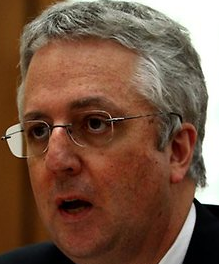The ABC of Cuts.

So, Communications Minister Malcolm Turnbull has finally let the cat out of the bag.
A 5% annual cut for the ABC.
Given the government’s stance, Blind Freddy could have seen that one coming!
Those opposed to the cuts, like to beat it up as being more than $50-million a year.
It’s sounds so much bigger that way!
In reality, it’s best looked at as a percentage of the billion dollars plus of your money and mine that’s paid to the national broadcaster each year to provide a service to us.
That’s right; it’s supposed to be a service to us, and, the ABC should never be regarded as a refuge where they provide people with superfluous jobs, even though it’s a fashionable concept in these times of ‘entitlement’.
Six million dollars of those cuts are going to be applied to ABC radio.
It’s very sad that a lot of people are going to lose their jobs, but that’s not a new concept to broadcasting.
It’s always been a volatile business.
As there are no advertisements sold on the ABC, you really have to regard the government’s funding, as the equivalent of its revenue stream.
A 5% drop in annual revenues is nothing startling to commercial radio and television operators.
It’s the reality of the marketplace, and, it often happens year-on-year.
In fact, even major commercial networks have seen revenue slumps in the double digits from time to time.
Just take a look what’s happening right now in radio.
What you do as management, in those circumstances, is to react swiftly and ‘cut your cloth’ to match.
You do that cutting in your backroom, out of sight of your viewers and listeners.
Keeping that tailoring metaphor going, you don’t rush out and tear down your window display.
That’s the part of the operation you keep showing to the public.
It’s what attracts your audience, establishes your value, and, generates future revenues.
If you take that ‘window display’ or programming away, then you’re ‘out of sight, out of mind’ and your value to stakeholders is quickly forgotten.
.jpg) In the case of the ABC, establishing your value amongst the taxpayers, who involuntarily support you, is not done by providing a bloated backroom bureaucracy, regardless of how well it functions, but through what people see and what people hear at home or in their cars.
In the case of the ABC, establishing your value amongst the taxpayers, who involuntarily support you, is not done by providing a bloated backroom bureaucracy, regardless of how well it functions, but through what people see and what people hear at home or in their cars.
This is the basis by which ordinary taxpayers will judge whether they are receiving good value from their tax dollars or not.
I’m certainly not anti-ABC.
In fact, I believe the ABC should provide a news service that, within reason, covers the globe from an Australian perspective.
As a journalist, I think that is important.
We’re a mature and affluent nation, we deserve to know what is happening, and, it’s not considered viable for any commercial operation, radio or television, to staff international reporting bureaus on a widespread basis.
That’s a job that must be left to the ABC.
They should be charged with providing that coverage on our collective behalf, and, skilled management budgeting, even in the current circumstances, should allow that to continue.
As an Australian taxpayer, I viewed the immediate knee-jerk reaction by ABC management to threaten to reduce international bureaus and cut state-based current affairs programs as nothing more than a bad-tempered political foot-stamping exercise; an exercise in tearing down their ‘window display’ to make a statement and show who’s boss.
Every Australian taxpayer knows there’s fat in the backrooms of the ABC. It’s a given!
Staunch ABC supporters and unions may kid themselves that that’s OK because it provides jobs.
Most media industry people know, however, that there are far more people in the ABC providing the same services that far less people provide very effectively in commercial operations.
This ‘fat’ is called bureaucracy, and, it feeds on itself.
The unions, of course, will fight ‘tooth and nail’ to maintain the status quo on behalf of their members as long as they possibly can. That’s their job and it’s expected.
However, taming the ABC financially is like most foreign invaders have learned over the centuries about trying to win in Afghanistan.
It can be extremely frustrating and futile.
If I recall correctly, back in the Fraser era, Phillip Lynch’s razor gang tried to extract big savings from the ABC at a time when the ratio of bureaucrats-to-creative staff was around 10:1.
But, the government was outsmarted by the bureaucrats in that case.
By the time the monetary cuts were fully implemented, the ratio of bureaucrats-to-creatives ended up nearly double that.
The bureaucrats had been charged with the job of implementing those financial cuts, so guess who they sacrificed, and, along with the creative staff, much of the programming by which the viewers and listeners (taxpayers) judged the value they got from the ABC.
The bureaucrats didn’t care. They kept their jobs and their perks.
.jpg) There are some issues I don’t agree with Malcolm Turnbull on, but this is not one of them, and, the Minister cannot afford to have the outcome of Lynch’s ill-fated cuts repeated 30 years later.
There are some issues I don’t agree with Malcolm Turnbull on, but this is not one of them, and, the Minister cannot afford to have the outcome of Lynch’s ill-fated cuts repeated 30 years later.
Minister Turnbull needs to work out a way to ensure that the cuts he, as the sole shareholder (on behalf of the Australian people), wants implemented, are implemented in the right areas.
That will be a difficult task seeing the ABC has its independence enshrined in legislation.
Stacking the Board will be the best way to do it, and, that process has already started, but it is going to take a while to be effective.
If there are savings to be made in the efficiency of the backroom operations of the ABC, then they should be made.
Every business, public or private sector, should run leanly.
If this government is ever going to rein in the deficit they inherited, as they promised us they would at the 2013 election, then cuts have to be made in many areas, not just public broadcasting, and, we all know that no individual or group wants to be the one who has to bear any of the pain involved.
The upshot of this strategy is partly why the government’s polling figures are so low at present.
Unfortunately, there’s no magic wand to fix deficit problems. Hard choices have to be made.
 ABC Managing Director, Mark Scott, has a big responsibility here, and, a fine line to walk to protect his job.
ABC Managing Director, Mark Scott, has a big responsibility here, and, a fine line to walk to protect his job.
It’s a delegated management function to choose where these cuts will be implemented, and, those cuts, in reality, will probably be based on the existing management’s values and philosophies.
Let’s hope the bureaucrats don’t have too much influence in the process this time, and, flip into self-preservation mode, as they normally do.
A 5% funding cut doesn’t warrant a total destruction of the creative side of the ABC just to make a political statement.
In commercial terms, it’s nothing more than a revenue adjustment.
 About The Author:
About The Author:
Brad SMART has been a journalist, consultant, author, broadcaster, film director and was the former owner of the Smart Radio Network throughout Queensland. Brad can be contacted on email here.


